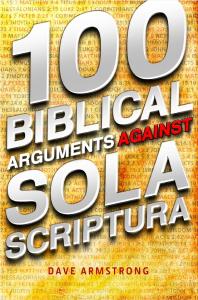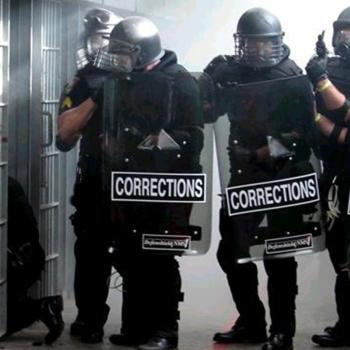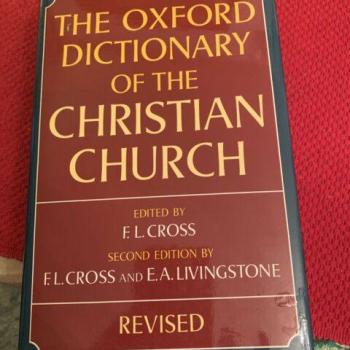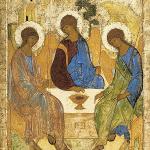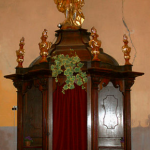“Please Hit ‘Subscribe’”! If you have received benefit from this or any of my other 4,600+ articles, please follow this blog by signing up (with your email address) on the sidebar to the right (you may have to scroll down a bit), above where there is an icon bar, “Sign Me Up!”: to receive notice when I post a new blog article. This is the equivalent of subscribing to a YouTube channel. Please also consider following me on Twitter / X and purchasing one or more of my 55 books. All of this helps me get more exposure, and (however little!) more income for my full-time apologetics work. Thanks so much and happy reading!
***
These are my replies to the James White portion of the legendary (notorious?) debate on this topic with Catholic apologist Patrick Madrid: “Does The Bible Teach Sola Scriptura?” It took place live on 28 September 1993, at the Bayview Orthodox Presbyterian Church in Chula Vista, California. As I always do when commenting on a debate that had included another Catholic, I won’t be reading or defending the Catholic side. Pat made his particular arguments, and did a fine job, as always. I will be concentrating on giving my replies to White’s remarks. The Right Rev. Bishop White’s words will be in blue. I use RSV in my Bible citations.
***
There have always been those who have refused to give the Scriptures their proper place.
Indeed. Ignoring the abundant data that Scripture provides about the Church and tradition (also necessary parts of the rule of faith) isn’t doing that. It’s pretending that what we may not personally care for is not in Holy Scripture. That’s not deferring to or respecting God’s inspired revelation, but rather, making ourselves the arbiters and judges of what portions of Scripture we will follow, and what parts we will minimize or ignore. “Pick-and-choose” theology, in other words, which is precisely what the heresies of history always did, too.
There have always been those who wished to add to Scripture their own authority and the unique teachings that set them apart.
Exactly what I was just saying that Protestants must do, if they abide by the man-made, unbiblical tradition of sola Scriptura . . .
White then contends that because St. Basil the Great appealed to Scripture in arguments with heretics, he must have believed in sola Scriptura. It’s not true. The two are not the same thing. The Bible — or the reverence of and recourse to it — is not equivalent to an outlook — sola Scriptura — whereby the Bible is considered the only infallible authority in Christianity (Church and tradition being excluded from such infallibility). Basil did not adhere to sola Scriptura, as I have documented several times (including in reply to White himself). Basil the Great accepted the authority of sacred tradition (in a way utterly at odds with sola Scriptura):
The one aim of the whole band of opponents and enemies of “sound doctrine” is to shake down the foundation of the faith of Christ by levelling apostolic tradition with the ground, and utterly destroying it. (The Holy Spirit, 25)
Now one of the institutions of Gregory is the very form of the doxology to which objection is now made, preserved by the Church on the authority of his tradition; . . . (The Holy Spirit, 29)
Let us now investigate what are our common conceptions concerning the Spirit, as well those which have been gathered by us from Holy Scripture concerning It as those which we have received from the unwritten tradition of the Fathers. (The Holy Spirit, 9:22)
[T]hey clamour for written proof, and reject as worthless the unwritten tradition of the Fathers. (The Holy Spirit, 25)
While the unwritten traditions are so many, and their bearing on “the mystery of godliness is so important, can they refuse to allow us a single word which has come down to us from the Fathers; – which we found, derived from untutored custom, abiding in unperverted churches; . . . (The Holy Spirit, 27)
But if the greater number of our mysteries are admitted into our constitution without written authority, then, in company with the many others, let us receive this one. For I hold it apostolic to abide also by the unwritten traditions. “I praise you,” it is said, “that ye remember me in all things, and keep the ordinances as I delivered them to you;” and “Hold fast the traditions which ye have been taught whether by word, or our Epistle.” (The Holy Spirit, 27)
Of the beliefs and practices whether generally accepted or publicly enjoined which are preserved in the Church some we possess derived from written teaching; others we have received delivered to us “in a mystery” by the tradition of the apostles; and both of these in relation to true religion have the same force. And these no one will gainsay;—no one, at all events, who is even moderately versed in the institutions of the Church. For were we to attempt to reject such customs as have no written authority, on the ground that the importance they possess is small, we should unintentionally injure the Gospel in its very vitals; or, rather, should make our public definition a mere phrase and nothing more. . . . For we are not, as is well known, content with what the apostle or the Gospel has recorded, but both in preface and conclusion we add other words as being of great importance to the validity of the ministry, and these we derive from unwritten teaching. . . . the Apostles and Fathers who laid down laws for the Church from the beginning thus guarded the awful dignity of the mysteries in secrecy and silence . . . Time will fail me if I attempt to recount the unwritten mysteries of the Church. . . . While the unwritten traditions are so many, and their bearing on “the mystery of godliness” is so important, can they refuse to allow us a single word which has come down to us from the Fathers;—which we found, derived from untutored custom, abiding in unperverted churches;—a word for which the arguments are strong, and which contributes in no small degree to the completeness of the force of the mystery? (The Holy Spirit, 30)
He believed in apostolic succession (in a way that Protestants have rejected):
[T]hat doctrine, which by the tradition of the Fathers has been preserved by an unbroken sequence of memory to our own day. (The Holy Spirit, 30)
That faith we have received; that faith we know is stamped with the marks of the Apostles; to that faith we assent, as well as to all that was canonically and lawfully promulgated in the Synodical Letter. (Letter #92 to the Italians and Gauls, 3)
He believed in the binding authority and infallibility and even a sort of quasi-inspiration of ecumenical councils (anathema to Protestantism):
[T]he same Fathers who once at Nicæa promulgated their great decree concerning the faith. Of this, some portions are universally accepted without cavil, but the homoousion, ill received in certain quarters, is still rejected by some. . . . To refuse to follow the Fathers, not holding their declaration of more authority than one’s own opinion, is conduct worthy of blame, as being brimful of self-sufficiency. (Letter #52 to the Canonicae)
Y]ou should confess the faith put forth by our Fathers once assembled at Nicæa, that you should not omit any one of its propositions, but bear in mind that the three hundred and eighteen who met together without strife did not speak without the operation of the Holy Ghost, . . . (Letter #114 to Cyriacus, at Tarsus; NPNF2-8)
Therefore, he did not believe in sola Scriptura; period!
Is the Bible the sole and infallible rule of faith for the Church?
No; according to that same Bible.
Or must we have other revelation from God?
Other revelation isn’t required; only other authoritative and infallible teaching: from the Church and tradition and apostolic succession and ecumenical councils and popes.
Do we need . . . the so-called Apostolic unwritten traditions of Rome?
Yes, just as Basil reiterated over and over. He clearly didn’t believe in the non-biblical notion of “inscripturation”: as White does.
Does the Bible teach its own sufficiency to function as the sole rule of faith for the Church?
No; it denies its own formal sufficiency for that purpose.
The doctrine of sola scriptura, simply stated, is that the Scriptures and the Scriptures alone are sufficient to function as the regula fide, the “rule of faith” for the Church. . . . That which is not found in Scripture is not binding upon the Christian conscience. . . . Their authority is not dependent upon man, Church or council. . . . the Bible is sufficient to function as the sole, infallible rule of faith for the Church.
It follows that councils and popes and tradition and the Church are not infallible and thus are not part of the rule of faith, according to Protestantism. And it also logically follows that whoever believes that any of these non-scriptural things are infallible, must by the same token deny sola Scriptura. I have shown by this method, that some twenty-five or more Church fathers all denied sola Scriptura: using White’s own definition, which is a pretty standard one. I was — arguably — utilizing an even more full and concise definition of sola Scriptura a year before this expression from White, in a treatise written on 9-14-92: later included in my book, A Biblical Defense of Catholicism (p. 4):
The concept of sola Scriptura, it must be noted, is not in principle opposed to the importance and validity of Church history, Tradition, ecumenical councils, or the authority of Church Fathers and prominent theologians. The difference lies in the relative position of authority held by Scripture and Church institutions and proclamations. In theory, the Bible judges all of these, since, for the Evangelical Protestant, it alone is infallible, and the Church, popes, and councils are not.
FOOTNOTES: Luther, Martin, On the Councils and the Churches, 1539; Sproul, R.C., “Sola Scriptura: Crucial to Evangelicalism,” in Boice, James Montgomery, ed., The Foundation of Biblical Authority, Grand Rapids, Michigan: Zondervan, 1978, 109; Brown, Robert McAfee, The Spirit of Protestantism, Oxford: Oxford Univ. Press, 1961, 67.
We begin by noting that Scripture is theopneustos, “God-breathed.”
No Catholic has ever denied this. But it’s irrelevant to the discussion of sola Scriptura, which entails the question of whether other sources of authority are infallible and binding. They need not be inspired in order to disprove sola Scriptura. White then trotted out (like every other apologist for sola Scriptura) 2 Timothy 3:16-17:
All scripture is inspired by God and profitable for teaching, for reproof, for correction, and for training in righteousness, [17] that the man of God may be complete, equipped for every good work.
I replied to this in my book, A Biblical Defense of Catholicism, as follows:
For example, to reason by analogy, let’s examine a very similar passage, Ephesians 4:11-15:
Ephesians 4:11-15 And his gifts were that some should be apostle, some prophets, some evangelists, some pastors and teachers, for the equipment of the saints, for the work of ministry, for building up the body of Christ, until we all attain to the unity of the faith and of the knowledge of the Son of God, to mature manhood, to the measure of the stature of the fulness of Christ; so that we may no longer be children, tossed to and fro and carried about with every wind of doctrine, by the cunning of men, by their craftiness in deceitful wiles. Rather, speaking the truth in love, we are able to grow up in every way into him who is the head, into Christ,
If the Greek artios (Revised Standard Version [RSV], complete; King James version [KJV], perfect) proves the sole sufficiency of Scripture in 2 Timothy, then teleios (RSV, mature manhood; KJV, perfect) in Ephesians would likewise prove the sufficiency of pastors, teachers, and so forth for the attainment of Christian perfection. Note that in Ephesians 4:11-15, the Christian believer is “equipped,” “built up,” brought into “unity and mature manhood,” “knowledge” of Jesus, “the fulness of Christ,” and even preserved from doctrinal confusion by means of the teaching function of the Church. This is a far stronger statement of the “perfecting” of the saints than 2 Timothy 3:16-17, yet it doesn’t even mention Scripture.
Therefore, the Protestant interpretation of 2 Timothy 3:16-17 proves too much, since if all nonscriptural elements are excluded in 2 Timothy, then, by analogy, Scripture would logically have to be excluded in Ephesians. It is far more reasonable to synthesize the two passages in an inclusive, complementary fashion, by recognizing that the mere absence of one or more elements in one passage does not mean that they are nonexistent. Thus, the Church and Scripture are both equally necessary and important for teaching. This is precisely the Catholic view. Neither passage is intended in an exclusive sense. (pp. 15-16)
It also can be noted that in 2 Timothy, Paul also makes reference to oral tradition three times (1:13-14; 2:2; 3:14).
The authority of the Church then, in teaching, and rebuking, and instructing, is derived, despite Roman Catholic claims to the contrary, from Scripture itself.
We don’t deny that. We deny that the two things ought to be pitted against each other in a — typically Protestant — false dichotomy.
Surely, here Paul would have to direct us to any and all other rules of faith that we would need to be complete but, he does not.
He certainly does, as I just documented, including in the verse just two verse before our passage, and in the first and second chapters, too:
2 Timothy 1:13-14 Follow the pattern of the sound words which you have heard from me, in the faith and love which are in Christ Jesus; [14] guard the truth that has been entrusted to you by the Holy Spirit who dwells within us.
2 Timothy 2:2 and what you have heard from me before many witnesses entrust to faithful men who will be able to teach others also.
2 Timothy 3:14 But as for you, continue in what you have learned and have firmly believed, knowing from whom you learned it
Now, Mr. Madrid, do you not believe that it is a good work to pray to Mary? Yet, the Scriptures nowhere teach this.
Scripture teaches (from Jesus Himself) that the rich man petitioned Abraham in prayer three times (Lk 16:24, 27-28, 30). Abraham nowhere rebukes him or tells him to pray only to God. Jesus is telling the story, in inspired Scripture, therefore it must be true theology. Thus, if Jesus taught that men can pray to Abraham, there is nothing stopping them from praying to (i.e., petitioning or asking to intercede) Mary the Mother of God the Son. If one creature and holy person can be prayed to, so can another, by the same token. Have at it!
Do you not believe that it is good to believe and teach that Mary was bodily assumed into Heaven? Yet, the Bible does not teach this.
It doesn’t list its own canon, either, or teach sola Scriptura, or sola fide (faith alone). That doesn’t stop Protestants from believing in all three. But Mary’s Assumption is completely consistent and harmonious with Scripture (being simply an early example of the resurrection of the body, promised to all of the elect; why not Jesus’ mother first?). Sola Scriptura and sola fide, on the other hand, are not. They’re contradicted by many other biblical passages (which would, I guess, explain why virtually no one believed in them until some fifteen centuries after Christ).
Do you not believe that the man of God should teach, in the Church, that the pope, in Rome, is infallible in his teaching office? Yet, the Scriptures know nothing of such a concept.
It certainly does. St. Peter exercised his infallibility at the council of Jerusalem (Acts 15). He gave the primary speech and provided the guiding principle (based on a direct vision from God regarding the Gentiles, that he recently experienced), which caused the assembly to be silent (15:12); then the letter based on it was described as “good to the Holy Spirit” (15:28). No less than St. Paul then went all through Asia Minor (Turkey) delivering “for observance the decisions which had been reached by the apostles and elders who were at Jerusalem” (16:4).
So we had an infallible pronouncement by the first pope and leader of the new Church, in conjunction with a council of important figures in the Church (apostles and elders), that was protected by the Holy Spirit, and binding on Christians far and wide. After Jerusalem was destroyed in 70 AD, it made sense for the Church to then be centered in Rome, since it was the capital of the empire. Peter and Paul both ended their lives there as martyrs. Sound familiar?
Paul here [2 Tim 3:16] teaches that the Bible is a rule of faith.
Yes, “a” rule of faith, but not the sole one.
For he says the Church’s function of teaching and rebuking and instructing is to be based upon God-inspired Scriptures.
It certainly is, but just not exclusively so. It doesn’t say “only Scripture” is the rule of faith, etc. That’s simply read into the passage by wishful thinking Protestants (eisegesis), in order to be force-fit into their arbitrary man-made tradition. It states that the Bible is profitable (of course) and is inspired (yep; who denies it?). Neither is the same thing as a rule of faith. And I’m sick and tired of Protestant apologists not recognizing this self-evident fact.
We see that Paul not only does not refer us to another rule of faith
False. He refers to tradition (including oral) three times in the same letter: once in the immediate context.
Therefore, I assert that the doctrine of sola scriptura is taught plainly in this passage. Mr. Madrid must be able to fully refute the information I have provided to you to win this evening’s debate.
I’m sure he did. It’s not difficult at all to do. Basically, it’s simple logic and citing obviously related biblical cross references. I certainly did so, too, in my replies above and will continue to do so in what remains of this reply.
Now, one might well ask, “Is this the only place where sola scriptura is taught?” Most certainly not, though it is the clearest.
Thus is manifest the Protestant difficulty in desperately attempting to prove this false doctrine from Scripture. If this is the best they can come up with (and most of them say it is), how pathetic and pitiful indeed is the case, since this proves nothing whatsoever of what is required to be proven. That being the case, Protestants simply pretend that it proves what it doesn’t prove, and go on their merry way. It would be comical if it weren’t so tragic.
Mr. Madrid is going to have to prove that these oral traditions are “theopneusto” [God-breathed; inspired] or they cannot function along with God-breathed Scripture.
This is the same fallacy again. Not all binding authority is required to be inspired Scripture. Scripture never says that it is the sole authority or rule of faith. And it presents other things beside itself as quite authoritative. For example, “the church of the living God, the pillar and bulwark of the truth” (1 Tim 3:15). When one unpacks the meaning of that verse (as I did), it’s quite profound and unmistakable. I’ve already brought up the Jerusalem council, recorded in Acts 15 (I’ve written about it many times), which was guided by the Holy Spirit.
That wasn’t “the Bible” when it happened. Parts of it were recorded in the Bible. But it itself was a council, not a written revelation. The Holy Spirit confirmed what was decided. That may not be literally “God-breathed” but it was very close, if not. If something is led and overseen by God, then in a large sense it is inspired and “God breathed”. But in any event it was authoritative, which is why St. Paul proclaimed its decree far and wide.
let’s take a look at 2 Timothy 2:2. . . . “But you my child, be strong in the grace which is in Christ Jesus, and what you have heard from me in the presence of many witnesses, these things entrust to faithful men who will be able to teach others. Join in suffering as a good soldier of Christ Jesus.” Did you hear anything in there that denies sola scriptura?
Yes. It’s authoritative oral tradition, rather than the Bible. So it’s describing a rule of faith contrary to sola Scriptura.
Well we’re told, “You see, well you’re supposed to entrust to faithful men who will be able to teach others those that you’ve heard from me.” And you need to listen to every presentation that is made by the Roman Catholic apologists because there is an underlying assumption, you see. As soon as you hear all these passages–and we’re going to take the time to look at 2 Thessalonians 2:15 and all the rest of that–here’s the assumption, that if you hear about a spoken tradition, if you hear about, for example, here Timothy hearing things in the presence of Paul, those things must contain information, like maybe the Immaculate Conception or Bodily Assumption of Mary, or Papal Infallibility…they must contain some different data that is being passed on, rather than what’s in Scripture. There’s the problem.
It’s not a problem because we don’t believe it “must contain information” other “than what’s in Scripture.” It may or it may not. It’s silly for White to pretend that this is what we believe.
I challenge Mr. Madrid to show us any bit of evidence that any time that the term “tradition” is used in Scripture, where the Christian Church is passing it on, that it means that what is in that tradition differs from what’s in the New Testament. That’s the assumption that must be proven by the Roman Catholic for these citations of these passages to be relevant at all.
This accomplishes little in this debate, since White has the same task in the opposite direction. He has to prove that every tradition mentioned in the Bible, or generic, broad apostolic tradition is the same as what we have in the Bible. He can no more prove that than we can prove the opposite (even though it’s not our burden to do so in the first place, as white vainly imagines). But being a sophist as he is, he plays up our supposed responsibility, while ignoring his own, that is even more pressing than our task, since it inexorably follows from his own viewpoint on the rule of faith. The Bible arguably presents tradition as synonymous with the gospel, the Word of God, the truth, the faith, the gospel, the teaching, etc.
Paul obviously has in mind a concrete body of teachings that he taught the churches that he established. It’s not just one thing. If that were the case, he would have specified it. But he doesn’t do so in almost all cases. Thayer’s Greek Lexicon (Strong’s Greek word #3862) states that the same word (παράδοσιν – parádosis — tradition) means “a giving over which is done by word of mouth or in writing what is delivered . . . instruction . . . the substance of the teaching” in 2 Thessalonians 3:6, whereas he thinks it refers to “particular injunctions of Paul’s instruction” in 1 Corinthians 11:2 and 2 Thessalonians 2:15. He holds that the word can refer to “precepts received from the fathers, whether handed down in the O. T. books or orally” (Gal 1:14: “the traditions of my fathers”): with some restricting or including the reference in that passage to “extra-biblical traditions”.
In the Greek Septuagint (LXX) it’s used for “the law [of God]”: Ezra 7:26. Kittel’s Theological Dictionary of the New Testament (one-volume edition, p. 168, also, like Thayer, not a Catholic work, affirms that it refers to “written as well as unwritten traditions” in Galatians 1:14, and is equated with “Christian teaching” (1 Cor 11:2; 2 Thess 2:15); also deducing from 1 Corinthians 15:3 ff. and 11:23 ff., “that it is older than Paul and is already acquiring a fixed form in his day.” Any way we look at it, there is plenty of tradition in the sense that Catholics refer to it (including oral) in the New Testament.
Now, did Paul teach something different in the presence of many witnesses that he taught in his epistle to the Romans or the Galatians?
Undeniably, that is entirely possible, and White can make no argument that proves that it is impossible. So his claim has no substantive content. I agree that most of it would likely be basically the theology we have in the New Testament; but no one can prove that all of it would be that.
here’s one of those passages that talks about tradition, or teaching. 2 Thessalonians 3:6, “In the name of the Lord Jesus Christ we command you, brothers, to keep away from every brother that is idle and does not live according to the teaching or the tradition you received from us.” Oh, well, here’s this oral tradition, this oral tradition we need to keep! Really? No. Look back at 1 Thessalonians chapter 5 verse 14 as well as 1 Thessalonians chapter 4. Paul is referring back to the tradition he had already delivered to them, that is, in writing.
In 1 Thessalonians 5:14 Paul tells them to “admonish the elders.” But that doesn’t cover the whole content of 2 Thessalonians 3:6. It’s only a secondary matter. The relevance of the latter verse is the second part, which refers to “the tradition you received from us.” Nor can White prove that whatever is in 1 Thessalonians 4 is identical to what he is talking about in 2 Thessalonians 3:6. He simply cannot do so.
As we will see, the term “tradition” normally refers to that which was orally preached, but it’s the same message.
Well, it passes along part of the entire deposit of faith: some of which is not in Scripture, or not explicit there. Again, White can’t prove otherwise. Catholics can assert that authoritative tradition existed because the fathers massively bear witness to it.
In fact, in 2 Thessalonians 2:15 . . . it’s talking about the gospel.
White appears to have in mind the verse before: “To this he called you through our gospel, so that you may obtain the glory of our Lord Jesus Christ.” But this doesn’t necessarily have any direct correlation to the next verse: “So then, brethren, stand firm and hold to the traditions which you were taught by us, either by word of mouth or by letter.” Nothing there requires the reader to equate the “traditions” and the “gospel” altogether. In any event, all of it together comprises the apostolic deposit, passed down through apostolic succession. The linguist Thayer, as I noted above, thinks that 2 Thessalonians 2:15 refers to “particular injunctions of Paul’s instruction” — not the gospel per se. I submit that he is more of an authority on the biblical text than White is.
the teaching of the infallibility of the Bishop of Rome is a traditional teaching. It comes from tradition primarily. It is not found in Scripture. You’ll never find a reference to the Bishop of Rome or anything even regarding that in Scripture. The early Church didn’t believe it, and I’ve debated that, and would be glad to have more debates on that.
It’s there by analogy. See:
Infallible Individuals: Scriptural Examples & Analogies [2009]
Inspired & Infallible Prophets: Analogy to Infallible Popes [2-2-10]
Papacy & OT Infallible Prophets Analogy (vs. Gavin Ortlund) [3-14-24]
*
Practical Matters: Perhaps some of my 4,600+ free online articles (the most comprehensive “one-stop” Catholic apologetics site) or fifty-five books have helped you (by God’s grace) to decide to become Catholic or to return to the Church, or better understand some doctrines and why we believe them.
Or you may believe my work is worthy to support for the purpose of apologetics and evangelism in general. If so, please seriously consider a much-needed financial contribution. I’m always in need of more funds: especially monthly support. “The laborer is worthy of his wages” (1 Tim 5:18, NKJV). 1 December 2021 was my 20th anniversary as a full-time Catholic apologist, and February 2022 marked the 25th anniversary of my blog.
PayPal donations are the easiest: just send to my email address: apologistdave@gmail.com. Here’s also a second page to get to PayPal. You’ll see the term “Catholic Used Book Service”, which is my old side-business. To learn about the different methods of contributing (including Zelle), see my page: About Catholic Apologist Dave Armstrong / Donation Information. Thanks a million from the bottom of my heart!
*
***
Photo credit: see book and purchase information for this book of mine.
Summary: I comment on anti-Catholic Baptist apologist James White’s arguments, from a debate with Pat Madrid in 1993, and show how they are poorly argued and insufficient.


